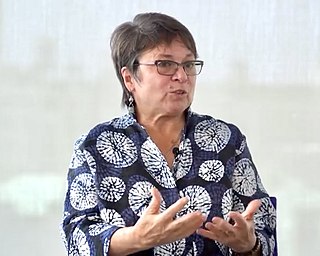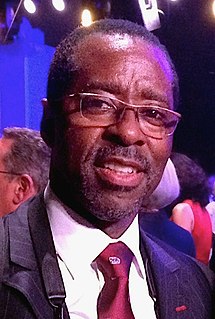A Quote by Cherrie Moraga
The political writer, then, is the ultimate optimist, believing people are capable of change and using words as one way to try and penetrate the privatism of our lives.
Related Quotes
A writer is a person who cares what words mean, what they say, how they say it. Writers know words are their way towards truth and freedom, and so they use them with care, with thought, with fear, with delight. By using words well they strengthen their souls. Story-tellers and poets spend their lives learning that skill and art of using words well. And their words make the souls of their readers stronger, brighter, deeper.
Be as pissed off as you want to be. Don’t hold back because you think it’s unladylike or some such nonsense. We shouldn’t be shamed out of our anger. We should be using it. Using it to make change in our own lives, and using it to make change in the lives around us. (I know, I’m cheesy.) So the next time someone calls you emotional, or asks if you’re PMSing, call them on their bullshit.
The way we live our daily lives is what most effects the situation of the world. If we can change our daily lives, then we can change our governments and can change the world. Our president and governments are us. They reflect our lifestyle and our way of thinking. The way we hold a cup of tea, pick up the newspaper or even use toilet paper are directly related to peace.
There are people with an explicit political bent complaining about people having political agendas while nominating stories with political agendas. Is it political to try to be diverse? Is it political to try to imagine a non-heteronormative society? Yes, because it involves politics. But how do they expect us to not write about our lives?
We don't want to give the controls to someone else; we want those reins ourselves. We want to get our way. And we get upset when things don't work out. . . . When we try to control someone else or events beyond the scope of our power, we lose. When we learn to discern the difference between what we can change and what we can't, we usually have an easier time expressing our power in our lives. Because we're not wasting all our energy using our power to change things we can't, we have a lot of energy left over to live our lives.
If you’re reading these words, perhaps it’s because something has kicked open the door for you, and you’re ready to embrace change. It isn’t enough to appreciate change from afar, or only in the abstract, or as something that can happen to other people but not to you. We need to create change for ourselves, in a workable way, as part of our everyday lives.
Jesus does not respond to our worry-filled way of living by saying that we should not be so busy with worldly affairs. He does not try to pull us away from the many events, activities, and people that make up our lives. . . . He asks us to shift the point of gravity, to relocate the center of our attention, to change our priorities. Jesus does not speak about a change of activities, a change in contacts, or even a change of pace. He speaks about a change of heart.
Our marvelous new information technologies boost our power and opportunities for political engagement, but they can also disempower us by contributing to extreme political mobilization that sometimes overwhelms our institutions. These institutions were designed for rural societies operation at a tiny fraction of today's speed and with a citizenry vastly less capable that today's. It's unclear how they will change to adapt to the new reality, but change they must.
Wes Anderson is a perfectionist, so you have to just be ready to try it this way, try it this way, try it that way, and then try it this way. And then, once you think you've got it all and it's done, then you're going to be called back in two or three months so you can try it that way and try it this way. You've got to give him all of it.






































